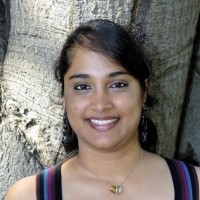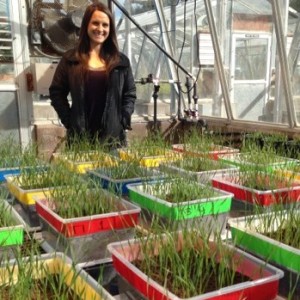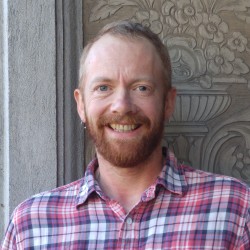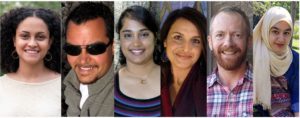The UC Global Food Initiative Program at Berkeley Lab enters its second year in offering research fellowships to three graduate students, in the amount of $4,000 each. This year’s selected fellows—two from UC Berkeley and one from UC Davis—will work with a Berkeley Lab mentor on a project that aligns with a Lab initiative in predictive agriculture.
UC President Janet Napolitano launched the Global Food Initiative in July 2014 as a way to intensify and expand the efforts of the world’s premier public research university to support healthy eating, sustainable agriculture, and food security. This year, UC has provided $12,500 to each campus for three student fellowships.
These Global Food Initiative efforts complement two Lab Initiatives. The Predictive Agriculture Initiative, a collaboration with UC Davis, aims to develop new scientific approaches to increase food production while simultaneously decreasing inputs of water and fertilizers. This research project is led by Peter Nico of the Earth & Environmental Sciences Area, who serves as the Berkeley Lab lead for both the Global Food Imitative and the Predictive Agriculture efforts. Secondly, the Precision Urban Agriculture Initiative, led by Romy Chakraborty of the Earth & Environmental Sciences Area, aims to address the intersection of two problems—the environmental damage caused by conventional agriculture and the lack of healthy, affordable produce for low-income urban populations.
Following are brief introductions of each of the three students and their research project. (View all UC GFI Fellow recipients here.)
Our 2015-2016 UC GFI Fellows – Class of 2016
 Kripa Akila Jagannathan is a graduate student in UC Berkeley’s Energy and Resources Group and is a second year UC GFI Fellow. She will be working with Andrew Jones in the Earth and Environmental Sciences Area to investigate whether climate models with good skills in predicting global metrics (such as global average temperature) are also good predictors of specific metrics of local climate that are relevant to fruit and nut farmers in California, such as chill hours.
Kripa Akila Jagannathan is a graduate student in UC Berkeley’s Energy and Resources Group and is a second year UC GFI Fellow. She will be working with Andrew Jones in the Earth and Environmental Sciences Area to investigate whether climate models with good skills in predicting global metrics (such as global average temperature) are also good predictors of specific metrics of local climate that are relevant to fruit and nut farmers in California, such as chill hours.
Her analysis will included a skill evaluation of about 30 different global climate models. She will also evaluate whether discarding models with low skill, leads to significant changes in the projections of future climate. This project would be an important addition to literature on global versus local skill of climate models. The results would be a step forward in efforts to provide farmers with the best available climate information for their specific local needs.
Kripa was also appointed as the Berkeley Lab’s UC GFI Student Ambassador to support student engagement and communication efforts for the 2015‐2016 academic year.
Review Kripa’s 1st year project here >>
 Linsey Shariq is a PhD candidate in the Civil and Environmental Engineering Department at UC Davis. Her Berkeley Lab mentor is Will Stringfellow in the Earth & Environmental Sciences Area.
Linsey Shariq is a PhD candidate in the Civil and Environmental Engineering Department at UC Davis. Her Berkeley Lab mentor is Will Stringfellow in the Earth & Environmental Sciences Area.
The waste stream generated by unconventional oil and gas extraction may provide a nontraditional irrigation source for farming, especially in drought-stricken states such as California. However, uncertainties about human health implications remain. Linsey’s research investigates the uptake of chemical additives during oil and gas extraction operations in wheat crops which were raised in controlled greenhouse experiments and irrigated with water amended with hydraulic fracturing chemicals. An analysis of hazardous organic and inorganic chemicals of concern will be performed; the results will populate human health assessment models, and risks from crop consumption will be reported.
 Sarick Matzen is a PhD candidate in UC Berkeley’s Environmental Science, Policy, and Management Program. Mentored by Peter Nico, of the Earth and Environmental Sciences Area, Sarick’s research will focus on investigating arsenic bioavailability in the context of urban agriculture.
Sarick Matzen is a PhD candidate in UC Berkeley’s Environmental Science, Policy, and Management Program. Mentored by Peter Nico, of the Earth and Environmental Sciences Area, Sarick’s research will focus on investigating arsenic bioavailability in the context of urban agriculture.
By constructing a laboratory analog of a human digestive tract based on recent models, Matzen will conduct lab experiments that will analyze arsenic bioaccessibility and plant availability in contaminated soils from a proposed community orchard site in Berkeley, CA. Results will inform other Berkeley Lab efforts on arsenic removal from water with investigation into behavior of arsenic in soils.
UC GFI Fellows – Class of 2015
The 2014-2015 Berkeley Lab UC GFI Fellows – Class of 2015 completed their 1st year project in June 2015. A summary of their goals are available on the UCOP website.

